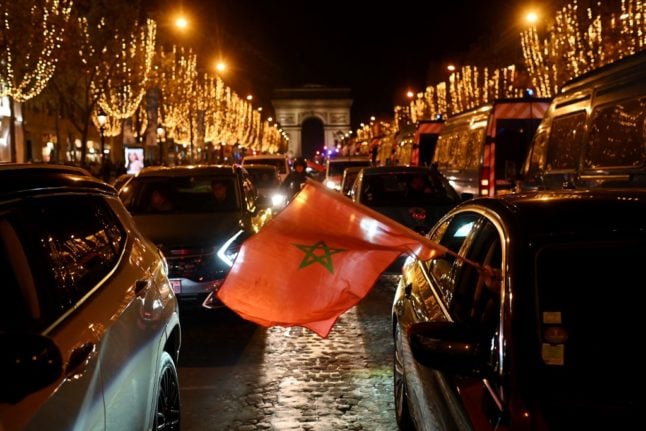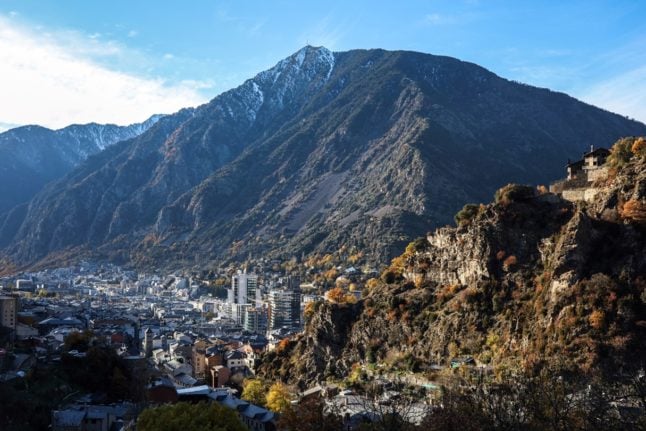Lady Susan Hussey and the Morocco football team have posed one of the great political-philosophical questions of our era. “So, where are you from?”
Lady Hussey, friend of the late Queen and Godmother of the Prince of Wales, was fired last week from her honorary job with the Royal family for harassing a black visitor to Buckingham Palace.
“What nationality are you?” she asked the British-born Ngozi Fulani. “Where do your people come from?… What part of Africa are you from?”
Tens of thousands of French people have taken to the streets of Paris and other cities to celebrate the victories of the Morocco football team in the World Cup. Most of the revellers have been joyful and peaceful. A minority has attacked the police and smashed shop windows and cars.
READ ALSO 5 reasons why the France-Morocco game is about more than football
By waving the Moroccan flag and wearing the Moroccan football jersey, they appear to have both asked and answered Lady Hussey’s question.
“Where are we from? We are from Morocco (even if we were born in France) and we are proud of it.”
National identity is a treacherous and complex question – more complicated than admitted by the politicians on the Right who bang on about “identity” or those on the Left who suggest that it is irrelevant.
Asked the same question on another occasion, many of those mostly young, French-born Morocco supporters would reply that they are French. On another occasion, they might have poured with other French people of all races onto the Champs Elysées to celebrate a French victory.
Tonight, after a potentially explosive semi-final in Qatar between France and Morocco, they face a dilemma. They will celebrate raucously if Morocco wins. What will they do if France wins? The once-joyous majority will stay at home; the violent minority will doubtless be violent.
READ ALSO Big screens and police warnings: What you need to know about the France v Morocco match
French far-right politicians have seized on the Moroccan football celebrations on French streets – both the violent and the peaceful ones – to score political goals.
The pundit turned failed (so far) politician, Eric Zemmour, said that he found it “bizarre that thousands of people who are supposed to be French celebrate a Moroccan victory”.
The new president of the Far Right Rassemblement National, Jordan Bardella, said that “there is a generation reaching adulthood in France which behaves like citizens of another country and permanently displays a desire for vengeance”.
At the same time, Bardella, who is supposed to be a young, modern, moderate nationalist, congratulated the France team on its success while mentioning by name only white players and staff members.
What of Aurélien Thchouameni, Ousmane Dembelé, Jules Koundé, Dayot Upamecano and Kylian Mbappé? Are they not also part of the generation of young adults of foreign origin who are, according to Bardella, “taught to hate France”?
I have a minor confession to make. After 25 years in France, I started watching the England-France quarter final on Saturday believing that I was a neutral and a supporter of both teams.
After two minutes, I found that I was anxious for England to stuff Les Bleus.
When France play Morocco, I will support France. When it comes to the Rugby world cup next year, I will support Ireland against all-comers because my wife cares about rugby and she is Irish.
The danger of the rising tide of “identity” politics is that many people in all countries now have mixed identities. I am a British-born, half-Belgian of eastern European jewish heritage. I mostly feel British but also identify with France and Ireland.
The sense of identity of the young people in the multi-racial inner suburbs of French cities is far more complex. It is a subject that I have discussed on many visits to “le banlieue” over the last 25 years.
They mostly associate with their country of origin to distinguish themselves from – and lord it over if they can – young people of other origins. The “Moroccans” celebrate not so much from hatred or rejection of France, as Bardella claims, but to stick it to the “Algerians”, “Tunisians” etc
The unjustified violence of the violent minority is not an attack on “France” but a continuation of the permanent banlieue war between many (not all) young people and “authority” and especially the police.
Those same young people are often more French, in attitudes and aspirations, than they realise.
More than half the Morocco squad – 14 players out of 26 – were born in France, Belgium, Italy, Spain or Canada. They chose to play for Morocco rather than the country of their birth.
At the same time, great players like Karim Benzema (Algerian origins but plays for France) and Romalu Lukaku (Congolese origin but plays for Belgium) say that they sometimes feel rejected by their European countries of birth. When they win they are French or Belgian; when they lose they are foreigners.
The fact that so many European-born people support or play for Morocco suggests superficially that Lady Hussey was right. People of colour are not really British or French but always “from somewhere else”.
But her attitude – and that of Zemmour and Bardella – is self-perpetuating. It reinforces the sense of alienation of people from migrant backgrounds. Her ladyship is unable to accept that brown or black people can be fully British; Bardella cannot bring himself to name any of the brown or black members of Les Bleus.
Identity is a dangerous, slippery, fascinating subject in a complex world which detests complexity. But all is not for the worst in the worst of all possible worlds.
If France wins the World Cup (again), there is every chance that French people of all races will pour onto the Champs Elysées (as they did in 1998 and 2018) to celebrate the triumph of a brown, white and black team.



 Please whitelist us to continue reading.
Please whitelist us to continue reading.
The identity problem is probably more widespread than is generally thought. Dealing with foreigners if you are a UK citizen: no problem, we’re British. But within the UK? An adopted child, I was brought up by an English couple (father from Seaford, mother from Highgate), but my biological mother was from Aboyne (Aberdeenshire). I feel, and behave, as a quintessential Englishman, but my blood is at least half Scottish. Whence my personal identity crisis!
Absolutely on the mark, Mr. Lichfield! Brilliant to connect the Lady Hussey’s stupid line of questioning with the politicians (and the world in general) refusing to acknowledge the complexity of our identities. There are, indeed, no simple answers about identity, regardless of type–racial, ethnic, national, or political. Except maybe the simple fact that it’s dead wrong to project and/or lever these identities to stir resentments, nurture hatred, and challenge the integrity and standing of others. On the dark side, this resonates for me with Hannah Arendt’s arguments about statelessness, that is, how refugees lacking legal membership in any state, seem to lose, in some people’s eyes, their very humanity. On the lighter side, I hear Che Guevara quote: “Every day people straighten up the hair. Why not the heart?”
Absolutely on the mark, Mr. Lichfield! Brilliant to link Lady Hussey’s stupid line of questioning to the reduing sports team loyalties to ethnic identity and then further to politicians’ regular denial of complexity, which is reflected sadly by the world in general these days. There are no simple answers about identity, whether it be ethnic, racial, national, or political. Except perhaps the simple idea that it’s wrong to project identity on another and to lever it to limit, marginalize, or even dehumanize. On the dark side, this resonates with Hannah Arendt’s idea about the “statelessness” of refugees, that is, how people with no legal membership in any state can be seen (by some) as lacking all rights, lacking even humanity. On the lighter side, I remember the Che Guevara quote: “Every day people straighten up the hair. Why not the heart?”